Unit6 SectionA GrammarFocus~4c(课件)【2023-2024学年人教九全英语高效实用备课Unit 6 When was it invented? 】
文档属性
| 名称 | Unit6 SectionA GrammarFocus~4c(课件)【2023-2024学年人教九全英语高效实用备课Unit 6 When was it invented? 】 |  | |
| 格式 | pptx | ||
| 文件大小 | 57.3MB | ||
| 资源类型 | 试卷 | ||
| 版本资源 | 人教新目标(Go for it)版 | ||
| 科目 | 英语 | ||
| 更新时间 | 2023-09-19 17:14:38 | ||
图片预览

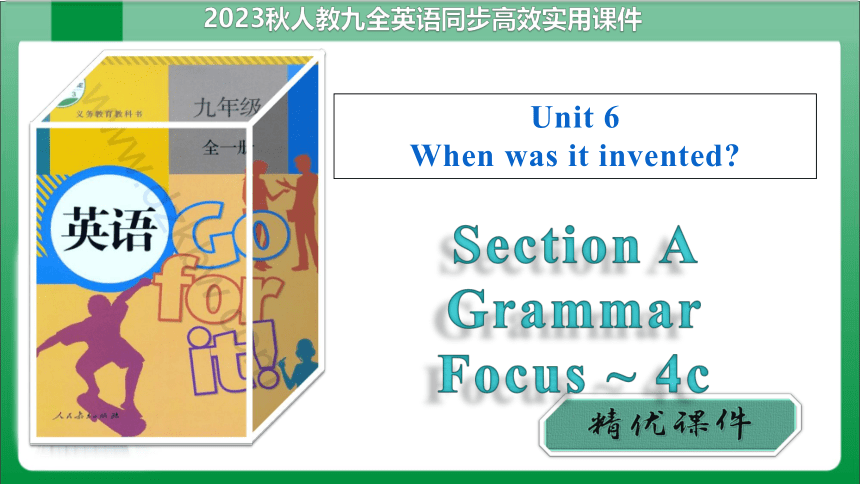
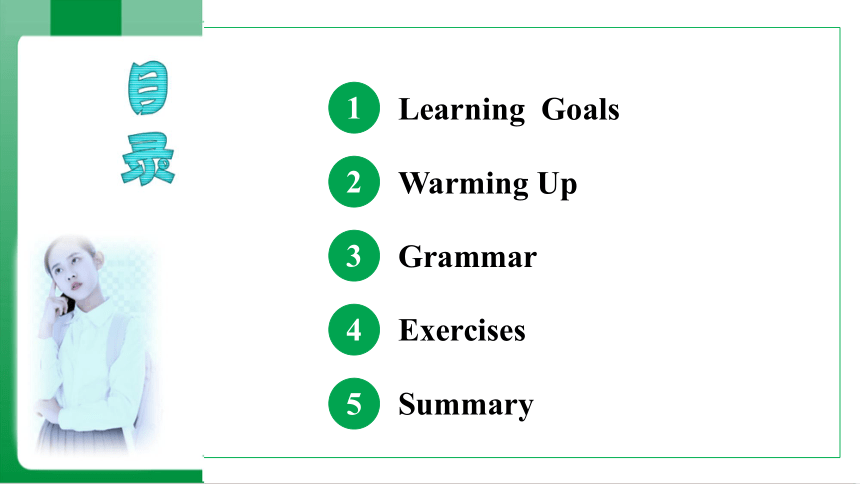
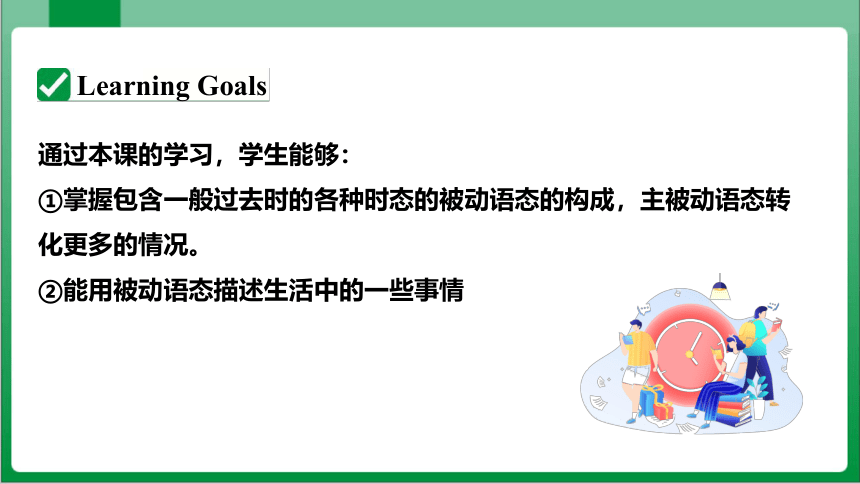

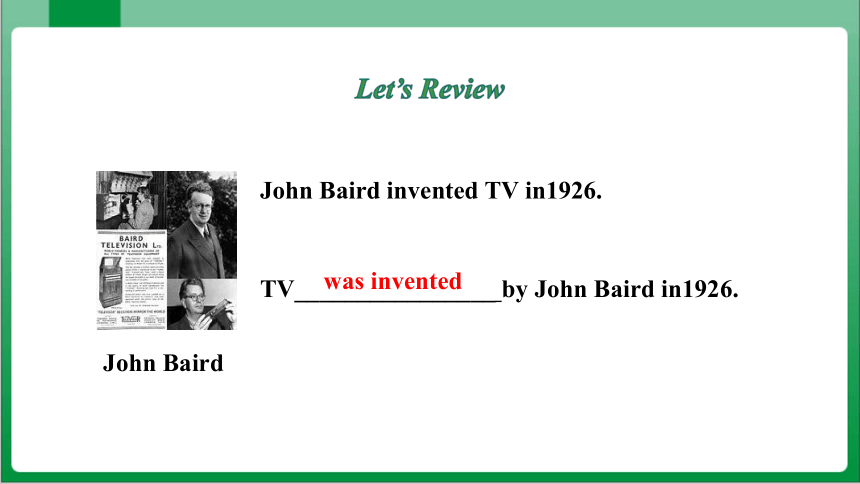
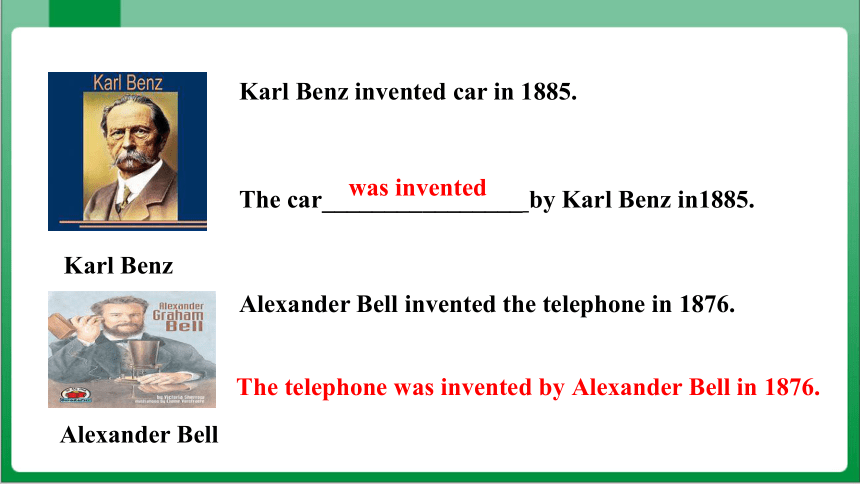
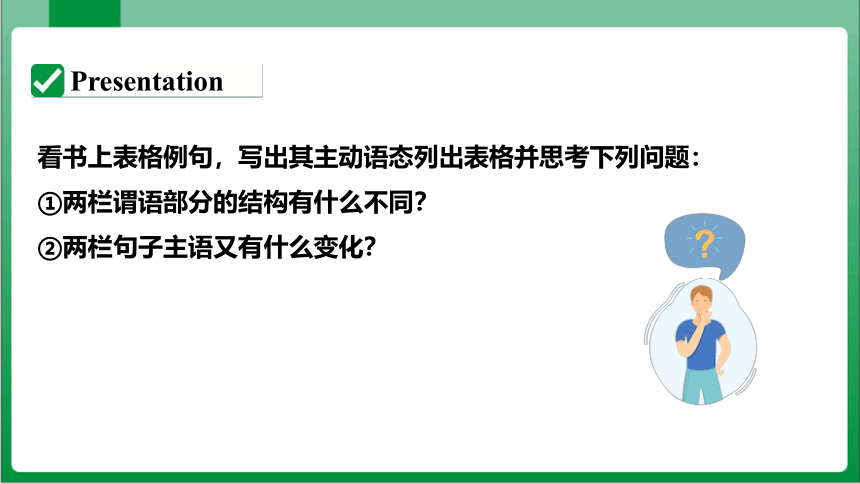
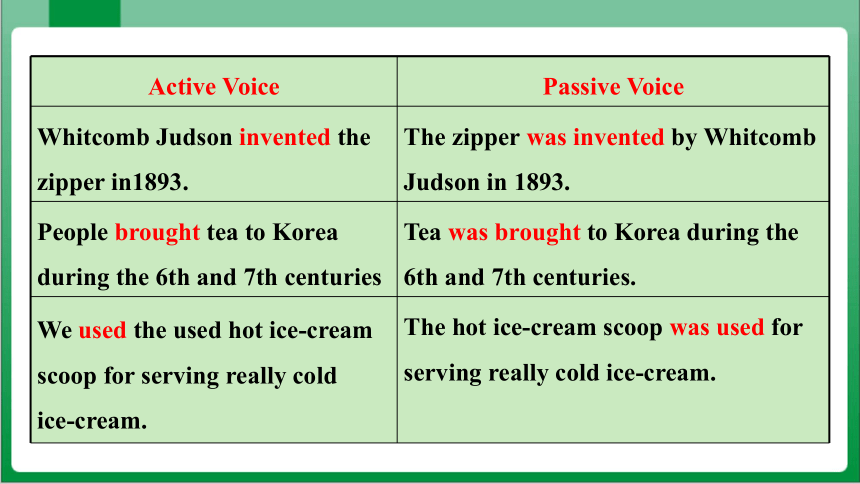
文档简介
(共28张PPT)
人教九上英语同步精品课件
人教版九年级上册
Unit 6
When was it invented
Section A Grammar Focus ~ 4c
Learning Goals
Warming Up
Grammar
Summary
Exercises
1
1
2
3
4
5
通过本课的学习,学生能够:
①掌握包含一般过去时的各种时态的被动语态的构成,主被动语态转化更多的情况。
②能用被动语态描述生活中的一些事情
Learning Goals
Warming Up
Let’s pay attention to the first sentence of this song:
Let’s enjoy a song first.
字面:
隐含:
I’m just a little bit caught in the middle.
我有点被抓在中间了。
我有一点左右为难。
be caught 被抓 “被动语态”
Let’s Review
John Baird
John Baird invented TV in1926.
TV________________ by John Baird in1926.
was invented
Karl Benz
Karl Benz invented car in 1885.
The car________________ by Karl Benz in1885.
was invented
Alexander Bell
Alexander Bell invented the telephone in 1876.
The telephone was invented by Alexander Bell in 1876.
Presentation
看书上表格例句,写出其主动语态列出表格并思考下列问题:
①两栏谓语部分的结构有什么不同?
②两栏句子主语又有什么变化?
Active Voice Passive Voice
Whitcomb Judson invented the zipper in1893. The zipper was invented by Whitcomb Judson in 1893.
People brought tea to Korea during the 6th and 7th centuries Tea was brought to Korea during the 6th and 7th centuries.
We used the used hot ice cream scoop for serving really cold ice cream. The hot ice cream scoop was used for serving really cold ice cream.
一般过去时被动语态
一般过去时被动语态的结构为“主语+ was /were +及物动词的过去分词(+by+动作的执行者).”。如:
Trees were planted last spring.去年春天种了树。
1. 肯定句:
主语+was / were+及物动词的过去分词+其他.
2. 否定句:
3. 一般疑问句:
主语+ was/were not+及物动词的过去分词+其他.
Was/Were +主语 +及物动词的过去分词+其他
1. 有些短语动词相当于及物动词,变为被动句时介词或副词不能去掉。
主动语态变被动语态应注意的问题
e.g. They put off the sports meeting because of the weather.
→ The sports meeting was put off because of the weather.
2. 主动句中感官动词see / hear / watch / feel等和使役动词make / let / have等后跟省略to的动词不定式,变为被动语态时应加上不定式标志to。
e.g. I saw a tall man play basketball there.
→ A tall man was seen to play basketball there.
3. 含有双宾语的主动句变为被动句时,通常把指“人”的间接宾语变为主语,指“物”的直接宾语保留不变;如果把指“物”的直接宾语变为主语,则在间接语前加to或for。
e.g. My father gave me an e-dictionary yesterday.
→ I was given an e-dictionary yesterday.
→ An e-dictionary was given to me yesterday.
4. 系动词、不及物动词或某些短语动词(happen, take place, come true, fall asleep…)没有被动语态。
时态 谓语动词形式
一般现在时 am/is/are+ done
一般过去时 was/were + done
一般将来时
现在进行时
过去进行时
现在完成时
过去完成时
过去将来时
will be done/ be (am,is,are) going to+ be done
am/is/are+ being done
was/were+ done
have/has+ been done
had + been done
Would be done/be(was,were)going to +be done
将下列句子变为被动语态。
1. He chose six story books the other day.
Six story books _____ _______ by him the other day.
2. Uncle Lee gave Jack a large cake for he painted the wall wonderfully.
Jack _____ _____ a large cake for he painted the wall wonderfully.
3. A mouse ate half of the cake last night.
Half of the cake _____ _____ by a mouse last night.
was given
were chosen
was eaten
Practice
将下列句子变为主动语态。
1. Were these machines invented by Edison
_____ Edison _______ these machines
2. The post card was sent to Linda by Paul.
Paul _____ the post card ___ Linda.
3. America was discovered by Columbus.
Columbus __________ America.
sent to
discovered
Did invent
4a.Rewrite the sentences using the passive voice.
1.They sold the fridge at a low price .
The fridge was sold at a low price.
2.Somebody stole my camera from my hotel room.
____________________________________________________________
3.Where did you take these photos
____________________________________________________________
My camera was stolen from my hotel room by somebody.
Where were these photos taken by you
n. /fr d /冰箱
4.Our parents advised us not to go out alone.
____________________________________________________________
5. Different writers translated the book into different languages.
____________________________________________________________
We were advised not to go out alone by our parents.
The book was translated into different languages by different writers.
advise sb. (not) to do sth. 建议某人(不要)做某事
translate...into... 把……翻译成……
plete the sentences with the correct forms of the verbs in the box.
eat lock like ring invite break tell bring
1. You ____________ to the party last night, weren’t you Why didn’t you go
2.The earthquake happened all of a sudden,but luckily the villagers _____________ to a safe place.
3. The door __________ when we arrived,so we _______ the bell.
were invited
were brought
rang
was locked
v. 锁上,锁住 n.锁
v. 发出钟声或铃声,打电话(rang-rung)
n.地震
突然
n.钟声;铃声
4. The students ________ not to eat or drink in class, but Ruby ______the rule when she started eating a biscuit in science class.
5.The cookies ___________ by the hungry kids in less than 20 minutes,and they really ________ them.
eat lock like ring invite break tell bring
were told
were eaten
liked
broke
n.饼干
n.曲奇饼
4c.Decide whether active or passive forms should be used in these sentences. Write the correct forms in the blanks.
The telephone ____________ (invent) by Alexander Graham Bell. He _________(born) in 1847.Mr.Bell ________(work) on the invention of the telephone with Thomas Watson. In 1875,Mr. Bell _____________ (learn) how to send musical notes through an instrument similar to a telephone. Finally,the telephone _____________(invent) in 1876.The first sentence that ________(say) on the telephone by Mr. Bell was “Mr. Watson,come here;I want to see you.” Today the telephone ________(use) around the world.
was invented
was born
worked
learned/learnt
was invented
was said
is used
Describe an invention using passive voice as much as possible.You can refer to the mind map below.
how
when
who
what
Invention
Invention
Production
Exercises
完成句子。
Leaflets _______________________________________
______________________.
(hand out/to people in the street/volunteers).
Warm clothes ______________________________.
(collect/for poor people)
were sent to children in poor areas by the
Class 1, Grade 8 students
were collected for poor people
A charity show_______________________________.
(hold/the Students’ Union)
was held by the students’ Union
2.Amy and Daniel are talking about plete their conversation with the words in brackets using the passive voice.
Amy: I’m reading a book about Oxfam.
Daniel: Really Please tell me about it.
Amy: OK. Oxfam (1) ________________ (set up) in the UK in 1942, and the first Oxfam shop (2) ________________ (open) in 1948. Now it has
about 15,000 shops all over the world. A lot of things (3) _________ (sell) in Oxfam shops, including books. The money (4) __________ (use) by Oxfam to help poor people.
was set up
was opened
are sold
is used
Daniel: That’s good. There are also some charity projects in China. One of them (5) ___________ (call) Project Hope. It (6)__________ (start) in 1989. With its help, millions of poor children all over the country
(7) ____________ (give) basic education.
Amy: Yes. Many schools (8) ___________ (build) in poor areas each year.
is called
was started
were given
are built
构成
一般过去式被动语态
主被动转换
主语+ was /were +及物动词的过去分词(+by+动作的执行者)
动词短语中的介词、副词
感官动词、使役动词
双宾语
Summary
谢谢
21世纪教育网(www.21cnjy.com)
中小学教育资源网站
兼职招聘:
https://www.21cnjy.com/recruitment/home/admin
人教九上英语同步精品课件
人教版九年级上册
Unit 6
When was it invented
Section A Grammar Focus ~ 4c
Learning Goals
Warming Up
Grammar
Summary
Exercises
1
1
2
3
4
5
通过本课的学习,学生能够:
①掌握包含一般过去时的各种时态的被动语态的构成,主被动语态转化更多的情况。
②能用被动语态描述生活中的一些事情
Learning Goals
Warming Up
Let’s pay attention to the first sentence of this song:
Let’s enjoy a song first.
字面:
隐含:
I’m just a little bit caught in the middle.
我有点被抓在中间了。
我有一点左右为难。
be caught 被抓 “被动语态”
Let’s Review
John Baird
John Baird invented TV in1926.
TV________________ by John Baird in1926.
was invented
Karl Benz
Karl Benz invented car in 1885.
The car________________ by Karl Benz in1885.
was invented
Alexander Bell
Alexander Bell invented the telephone in 1876.
The telephone was invented by Alexander Bell in 1876.
Presentation
看书上表格例句,写出其主动语态列出表格并思考下列问题:
①两栏谓语部分的结构有什么不同?
②两栏句子主语又有什么变化?
Active Voice Passive Voice
Whitcomb Judson invented the zipper in1893. The zipper was invented by Whitcomb Judson in 1893.
People brought tea to Korea during the 6th and 7th centuries Tea was brought to Korea during the 6th and 7th centuries.
We used the used hot ice cream scoop for serving really cold ice cream. The hot ice cream scoop was used for serving really cold ice cream.
一般过去时被动语态
一般过去时被动语态的结构为“主语+ was /were +及物动词的过去分词(+by+动作的执行者).”。如:
Trees were planted last spring.去年春天种了树。
1. 肯定句:
主语+was / were+及物动词的过去分词+其他.
2. 否定句:
3. 一般疑问句:
主语+ was/were not+及物动词的过去分词+其他.
Was/Were +主语 +及物动词的过去分词+其他
1. 有些短语动词相当于及物动词,变为被动句时介词或副词不能去掉。
主动语态变被动语态应注意的问题
e.g. They put off the sports meeting because of the weather.
→ The sports meeting was put off because of the weather.
2. 主动句中感官动词see / hear / watch / feel等和使役动词make / let / have等后跟省略to的动词不定式,变为被动语态时应加上不定式标志to。
e.g. I saw a tall man play basketball there.
→ A tall man was seen to play basketball there.
3. 含有双宾语的主动句变为被动句时,通常把指“人”的间接宾语变为主语,指“物”的直接宾语保留不变;如果把指“物”的直接宾语变为主语,则在间接语前加to或for。
e.g. My father gave me an e-dictionary yesterday.
→ I was given an e-dictionary yesterday.
→ An e-dictionary was given to me yesterday.
4. 系动词、不及物动词或某些短语动词(happen, take place, come true, fall asleep…)没有被动语态。
时态 谓语动词形式
一般现在时 am/is/are+ done
一般过去时 was/were + done
一般将来时
现在进行时
过去进行时
现在完成时
过去完成时
过去将来时
will be done/ be (am,is,are) going to+ be done
am/is/are+ being done
was/were+ done
have/has+ been done
had + been done
Would be done/be(was,were)going to +be done
将下列句子变为被动语态。
1. He chose six story books the other day.
Six story books _____ _______ by him the other day.
2. Uncle Lee gave Jack a large cake for he painted the wall wonderfully.
Jack _____ _____ a large cake for he painted the wall wonderfully.
3. A mouse ate half of the cake last night.
Half of the cake _____ _____ by a mouse last night.
was given
were chosen
was eaten
Practice
将下列句子变为主动语态。
1. Were these machines invented by Edison
_____ Edison _______ these machines
2. The post card was sent to Linda by Paul.
Paul _____ the post card ___ Linda.
3. America was discovered by Columbus.
Columbus __________ America.
sent to
discovered
Did invent
4a.Rewrite the sentences using the passive voice.
1.They sold the fridge at a low price .
The fridge was sold at a low price.
2.Somebody stole my camera from my hotel room.
____________________________________________________________
3.Where did you take these photos
____________________________________________________________
My camera was stolen from my hotel room by somebody.
Where were these photos taken by you
n. /fr d /冰箱
4.Our parents advised us not to go out alone.
____________________________________________________________
5. Different writers translated the book into different languages.
____________________________________________________________
We were advised not to go out alone by our parents.
The book was translated into different languages by different writers.
advise sb. (not) to do sth. 建议某人(不要)做某事
translate...into... 把……翻译成……
plete the sentences with the correct forms of the verbs in the box.
eat lock like ring invite break tell bring
1. You ____________ to the party last night, weren’t you Why didn’t you go
2.The earthquake happened all of a sudden,but luckily the villagers _____________ to a safe place.
3. The door __________ when we arrived,so we _______ the bell.
were invited
were brought
rang
was locked
v. 锁上,锁住 n.锁
v. 发出钟声或铃声,打电话(rang-rung)
n.地震
突然
n.钟声;铃声
4. The students ________ not to eat or drink in class, but Ruby ______the rule when she started eating a biscuit in science class.
5.The cookies ___________ by the hungry kids in less than 20 minutes,and they really ________ them.
eat lock like ring invite break tell bring
were told
were eaten
liked
broke
n.饼干
n.曲奇饼
4c.Decide whether active or passive forms should be used in these sentences. Write the correct forms in the blanks.
The telephone ____________ (invent) by Alexander Graham Bell. He _________(born) in 1847.Mr.Bell ________(work) on the invention of the telephone with Thomas Watson. In 1875,Mr. Bell _____________ (learn) how to send musical notes through an instrument similar to a telephone. Finally,the telephone _____________(invent) in 1876.The first sentence that ________(say) on the telephone by Mr. Bell was “Mr. Watson,come here;I want to see you.” Today the telephone ________(use) around the world.
was invented
was born
worked
learned/learnt
was invented
was said
is used
Describe an invention using passive voice as much as possible.You can refer to the mind map below.
how
when
who
what
Invention
Invention
Production
Exercises
完成句子。
Leaflets _______________________________________
______________________.
(hand out/to people in the street/volunteers).
Warm clothes ______________________________.
(collect/for poor people)
were sent to children in poor areas by the
Class 1, Grade 8 students
were collected for poor people
A charity show_______________________________.
(hold/the Students’ Union)
was held by the students’ Union
2.Amy and Daniel are talking about plete their conversation with the words in brackets using the passive voice.
Amy: I’m reading a book about Oxfam.
Daniel: Really Please tell me about it.
Amy: OK. Oxfam (1) ________________ (set up) in the UK in 1942, and the first Oxfam shop (2) ________________ (open) in 1948. Now it has
about 15,000 shops all over the world. A lot of things (3) _________ (sell) in Oxfam shops, including books. The money (4) __________ (use) by Oxfam to help poor people.
was set up
was opened
are sold
is used
Daniel: That’s good. There are also some charity projects in China. One of them (5) ___________ (call) Project Hope. It (6)__________ (start) in 1989. With its help, millions of poor children all over the country
(7) ____________ (give) basic education.
Amy: Yes. Many schools (8) ___________ (build) in poor areas each year.
is called
was started
were given
are built
构成
一般过去式被动语态
主被动转换
主语+ was /were +及物动词的过去分词(+by+动作的执行者)
动词短语中的介词、副词
感官动词、使役动词
双宾语
Summary
谢谢
21世纪教育网(www.21cnjy.com)
中小学教育资源网站
兼职招聘:
https://www.21cnjy.com/recruitment/home/admin
同课章节目录
- Unit 1 How can we become good learners.
- Section A
- Section B
- Unit 2 I think that mooncakes are delicious!
- Section A
- Section B
- Unit 3 Could you please tell me where the restroom
- Section A
- Section B
- Unit 4 I used to be afraid of the dark.
- Section A
- Section B
- Unit 5 What are the shirts made of?
- Section A
- Section B
- Review of Units 1-5
- Unit 6 When was it invented?
- Section A
- Section B
- Unit 7 Teenagers should be allowed to choose their
- Section A
- Section B
- Unit 8 It must belong to Carla.
- Section A
- Section B
- Unit 9 I like music that I can dance to.
- Section A
- Section B
- Unit 10 You're supposed to shake hands.
- Section A
- Section B
- Review of Units 6-10
- Unit 11 Sad movies make me cry.
- Section A
- Section B
- Unit 12 Life is full of the unexpected
- Section A
- Section B
- Unit 13 We're trying to save the earth!
- Section A
- Section B
- Unit 14 I remember meeting all of you in Grade 7.
- Section A
- Section B
- Review of Units 11-14
